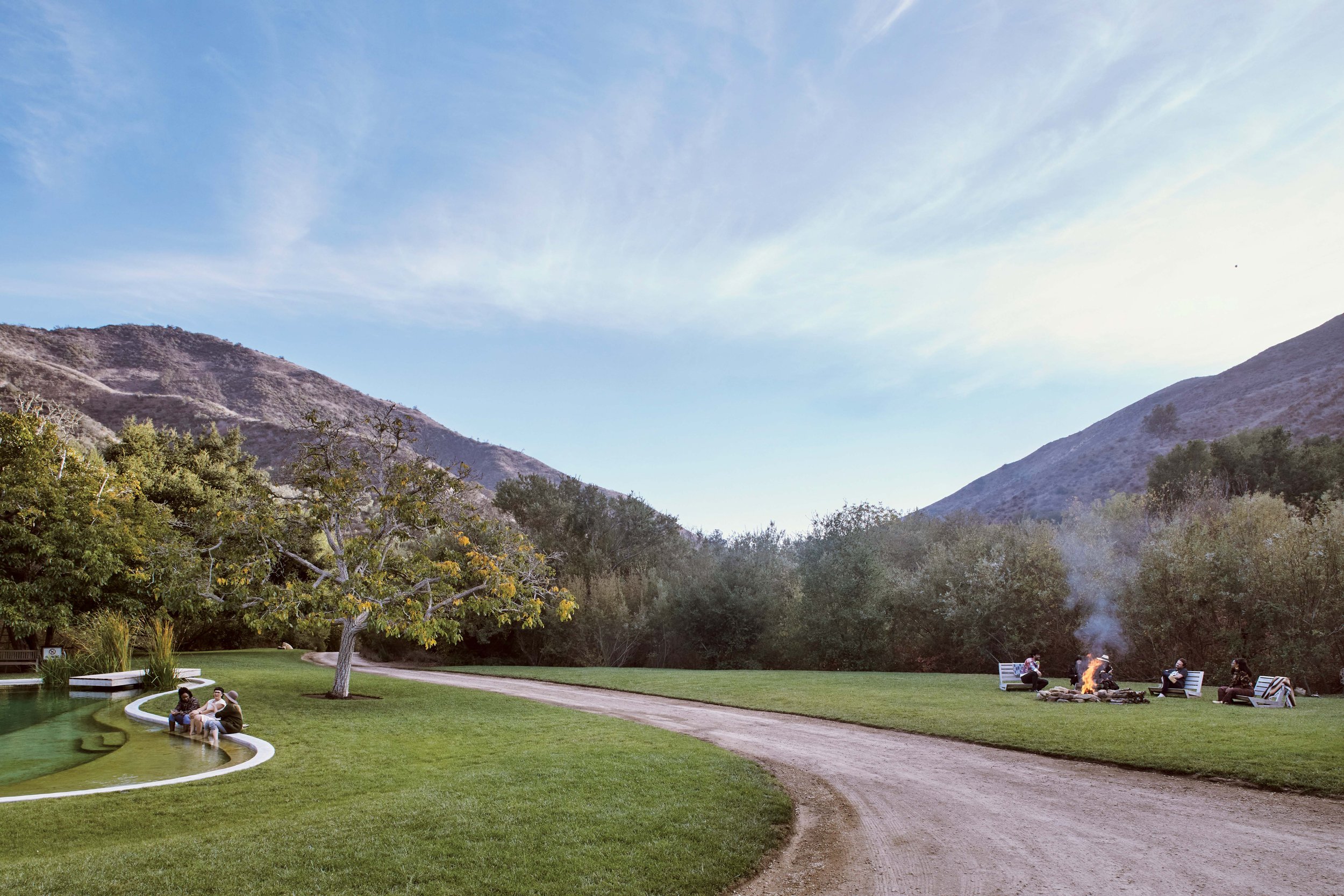On Kyle’s Pond
A Native New Yorker Finds Art in Nature
Kyle DeWoody afloat in the natural swimming pond at her Central Coast ranch.
Written by L.D. Porter | Photographs by Sam Frost
She’s been at the center of the art world for most of her life. But for the past five years, Kyle DeWoody has spent much of her time in rural Ventura County, navigating a Kubota utility vehicle over uneven terrain to see how her avocado, banana, and mango trees are faring. This may shock those familiar with her undeniably glamorous image, featured in Vogue, Vanity Fair, and W magazine, and on countless art blogs. But close companions know it’s simply another interesting curve in the New York native’s fascinating life trajectory.
Let’s start with genetics. Her father, James DeWoody, is a renowned artist whose work resides in many private and public collections, including New York’s Metropolitan Museum of Art. Her mother, Beth Rudin DeWoody, is a philanthropist, arts patron, and curator, known for championing overlooked artists. Given that pedigree, DeWoody says, “I had no chance of escaping the art world.”
In fact, the art world came to her. “It was obviously an incredible treat to grow up around not only amazing art but amazing artists,” she says, adding, “most of my parents’ close friends were artists or curators.” Art history was her chosen topic at Washington University in St. Louis, and her real-world experience was honed by stints at the Whitney Museum and Creative Time, a nonprofit institution that commissions public art projects.
She co-founded the e-commerce site Grey Area in 2011, with unique editions of art, jewelry, and objets; it ultimately expanded to include pop-up installations combining art exhibitions with art-related merchandise in tony locales like the Hamptons, Miami, and Los Angeles. Soon DeWoody became a go-to advisor for boutique hotels and brands seeking to create special environments with art. In other words, she’s a major influencer and tastemaker.
But success can exact a toll, and for DeWoody that amounted to a series of chronic health issues that demanded attention. The path to healing pointed to Los Angeles, where her brother Carlton had decamped a couple years earlier and her mother had established a pied-à-terre with husband Firooz Zahedi, a noted photographer. (L.A.’s stellar art scene likely sealed the deal.) DeWoody embarked on a program of self-care with health-care practitioners and holistic treatments including integrative stretching (a form of fascial release to repair structural and physiological issues) and dietary changes to eliminate inflammatory foods. The healing process fueled her desire to connect with the land in a direct way, a desire that was fulfilled when she discovered a sprawling ranch—formerly a walnut farm—in a lush valley between Carpinteria and Ojai.
From the moment she walked onto the property, DeWoody could sense that a natural pond would fit perfectly in the landscape. Used throughout Europe, eco-swimming pools eschew chemicals, using plants to filter the water. Although the concept is just starting to catch on stateside, DeWoody is a quintessential early adopter. She designed the pond’s configuration, and David Cameron helped put the final touches on the landscaping. “It’s an evolving technology and not for everyone,” she admits, “but it feels so good, and it’s incredible to swim next to lotuses and grasses.”
The pond is in plain view of a tiny ranch house DeWoody has lovingly refurbished with wood salvaged from fallen walnut trees on-site, the unfortunate victims of California’s now-pervasive drought. Hence the lovely walnut countertops, ceiling-beam edging, and custom furniture gracing her small abode, all achieved with the assistance of talented designer Case Fleher. As of now, roughly 5 of the ranch’s 65 acres are landscaped; the remaining acreage has been cleared for fire protection (thanks to seasoned caretaker Paco Alexander) but otherwise left to grow wild.
Of course, even in this bucolic setting, art and activism are never far from DeWoody’s mind. Before COVID, she curated projects like “My Kid Could Do That,” a recurring fund-raiser featuring childhood artwork of prominent artists (think Ed Ruscha and Catherine Opie) to provide free arts programming for children, and supported fund-raising efforts for L.A.-based Habits of Waste, a nonprofit whose goal is to activate simple behavioral changes to reap a powerful impact, like banning single-use straws and cutlery. “All the things we take for granted are no longer a given,” DeWoody notes: “how we treat each other, how we feed ourselves, how we ensure a future for our children. Everything needs to be fought for in a certain way.”
Along with her romantic partner Samuel Camburn, a screenwriter and actor, DeWoody recently hosted a group of artists affiliated with the Ojai Institute, an initiative of Ojai’s Carolyn Glasoe Bailey Foundation, gathered by the foundation’s executive director, Frederick Janka. Under spreading olive trees, they dined on a magnificent plant-focused feast prepared by chef Loria Stern. Ezra Woods of L.A.’s Pretend Plants & Flowers and artist Samantha Thomas foraged foliage to garnish the lavishly appointed table. Noted ceramist Yassi Mazandi brought along her handmade shot glasses (perfect for tequila quaffing), and artist Ry Rocklen added his Pixie ceramic sculptures.
DeWoody credits her involvement with the land as a key to her improved physical well-being. It’s also no surprise that the prospect of a pristine landscape would naturally whet her appetite for curating art installations, and that’s exactly what’s up next. The rest of the beautiful felled walnut wood will be distributed to artists to create pieces for a future art installation. The art world is indeed DeWoody’s world.
“All the things we take for granted are no longer a given: how we treat each other, how we feed ourselves, how we ensure a future for our children. Everything needs to be fought for in a certain way.”















